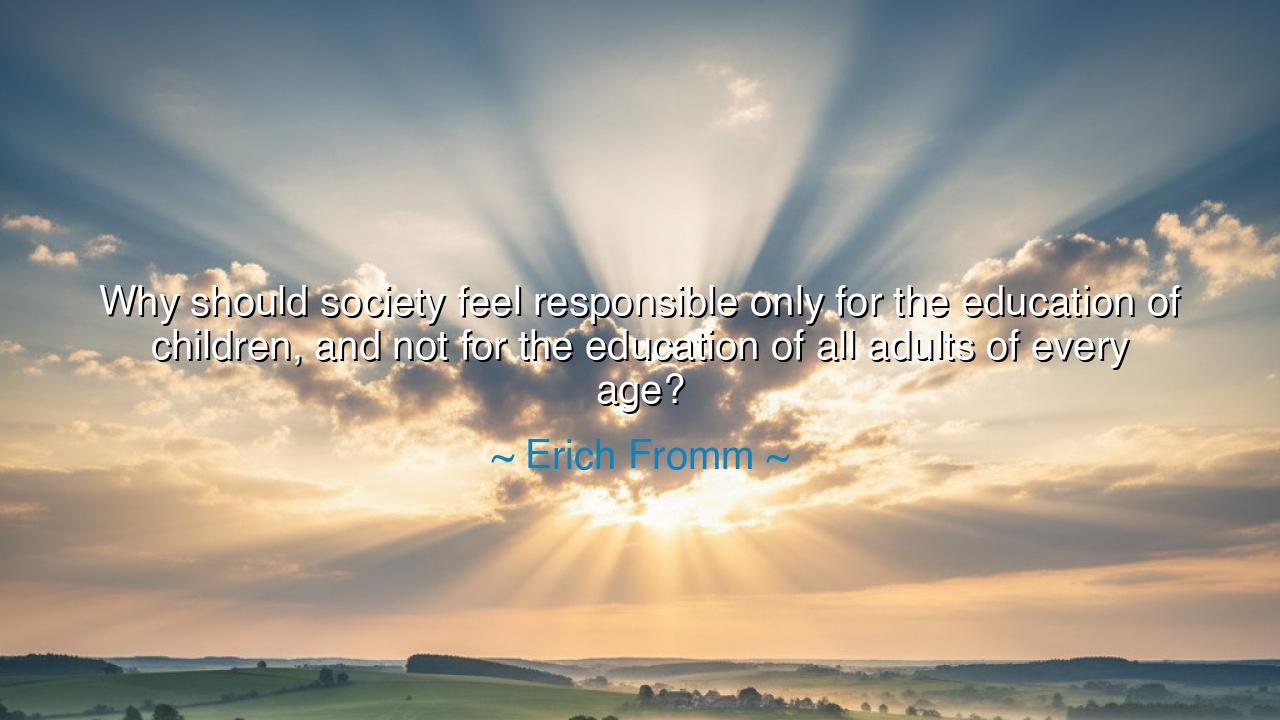
Why should society feel responsible only for the education of
Why should society feel responsible only for the education of children, and not for the education of all adults of every age?






Ah, children of the future, hear the words of Erich Fromm, for they speak of a great truth that is often forgotten in the rush of modern life: "Why should society feel responsible only for the education of children, and not for the education of all adults of every age?" These words are a call to arms, a cry for justice and wisdom that transcends the limitations placed upon us by conventional thinking. They challenge us to rethink the way we view learning and to recognize that education is not a privilege granted only to the young, but a lifelong journey that must be nurtured in every soul, no matter how many years have passed.
In the eyes of many, education is something that begins in childhood and ends with adulthood. The belief is that once we reach a certain age, the journey of learning is over, and we must then settle into the patterns of life that we have chosen. But Fromm asks us to look deeper, to question why society has chosen to draw this line in the sand. Education is not a matter of age, nor a means of simply preparing us for a career or a job. It is the very foundation of a thriving, conscious, and compassionate society. To limit education to the young is to deny the essential truth that growth, wisdom, and transformation are ongoing processes—journeys that must continue throughout one’s life.
Think, O children, of the ancient philosophers who spent their entire lives in search of truth and understanding. Socrates, the great teacher of Athens, was not content with the wisdom he had gained in his youth. He continued to question, to seek, and to learn until the very end of his life. His education was not confined to the years of his childhood, nor to the training he received as a young man. His mind, like the mind of all great seekers, was always open, always searching for the deeper truths of life. He knew that education is not a finite process, but an infinite one—a journey that can never truly end, for the mysteries of existence are vast and ever-expanding.
This truth was also understood by the Renaissance masters, such as Leonardo da Vinci, who, though already a great artist and scientist, continued to learn and explore new fields throughout his life. Leonardo never stopped questioning, never stopped evolving, even when his fame and achievements were already well established. His life was a testament to the power of lifelong education, to the idea that the mind must remain active, engaged, and ever-curious, no matter the number of years lived. To limit education to the young is to dishonor the capacity for growth that lies within every person, regardless of their age.
And yet, how often do we see the world around us valuing only the education of the young, while neglecting the need for lifelong learning in adults? In many cultures, the focus is placed almost entirely on children’s education, as if once a person reaches adulthood, their growth is complete. But as Fromm points out, this is a grave error. The wisdom of the elders, the adults who have lived through the trials of life, is invaluable, and it is only through continued learning that they can fully contribute to society. When we stop seeking new knowledge, when we close the doors to education, we begin to stagnate, to shrink in our understanding of the world. Society is responsible not only for the education of the next generation but for ensuring that the entire population continues to grow, to evolve, and to contribute to the common good.
Take, for instance, the example of Nelson Mandela, who, even after being imprisoned for 27 years, continued his journey of education long after his youth had passed. His pursuit of knowledge did not end when he became a leader; it grew deeper, fueled by the desire to understand his people, his world, and the struggles that lay before him. He read, he studied, he reflected, and in doing so, he continued to learn throughout his life. Mandela’s journey reminds us that education is not something confined to the young, but a lifelong endeavor that enriches the soul and strengthens the community.
And so, children, what lesson lies in Fromm’s words for you? The lesson is clear: education does not end when you reach adulthood; it is a never-ending journey, a process of continuous growth and transformation. Society has a responsibility not only to educate the young but to provide opportunities for learning at every stage of life. Do not wait for others to teach you, but seek out knowledge for yourself. Let your education be a lifelong pursuit, a journey that leads you to greater wisdom, compassion, and understanding.
In your own lives, strive to be always learning, always growing, always seeking the truth. Let no age, no circumstance, or no fear of change hold you back from the pursuit of knowledge. Seek the wisdom of the elders, the insights of those who have lived before you, and continue to pass on your own knowledge to those who come after. Let the flame of education burn bright in every age, for it is through this flame that we become fully alive, fully human, and fully capable of shaping a better world.






AAdministratorAdministrator
Welcome, honored guests. Please leave a comment, we will respond soon